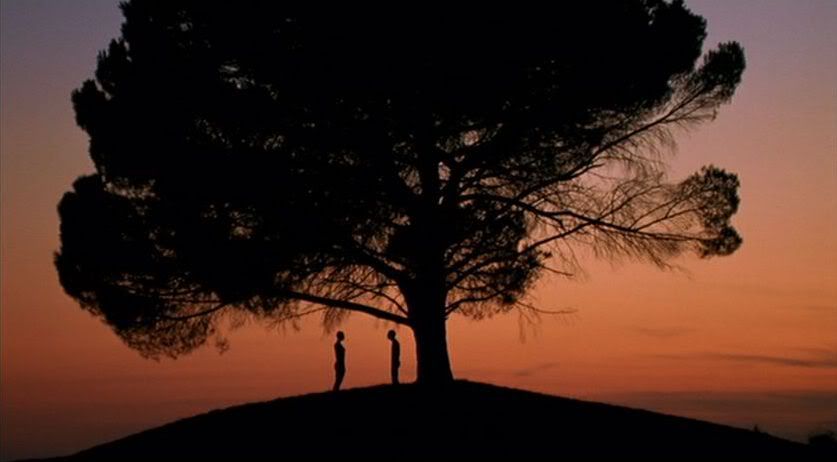
The heroine is a would-be murderer who inadvertently becomes a terrorist and is overcome with grief and shame, the hero is a policeman who loves and pities her for her anger and shame, they hide and run and shave their heads and when they are hopelessly cornered, they disappear into a dot in the sky and it is impossible to describe the terrible loveliness of the strange film called Heaven (2002).
Heaven is directed by Tom Twyker, known to me for Run, Lola Run, which I have long highlighted in my own film courses for its alternate timelines (including flash-forwards) and its brilliant use of a pounding, relentless music score (not to mention crazy animation and some insanely red hair on the heroine which always helps).
Heaven is conventional chronologically speaking, and yet it feels even more like a fable than Lola. In place of Lola's relentless techno, there's the ethereal sound of Arvo Part. Where Lola pounded through the streets, Twyker's camera seems to float high above the characters and the story. (It doesn't--it only seems to.) The illustration above, of the two lovers in their first and perhaps only bout of lovemaking, illustrates the lengths to which Twyker's team went to achieve the pictorialism of the film.
One commenter described it as a love story disguised as a thriller, one of those pieces where you can't seek justice from the authorities because they are the source of the injustice (in this case, a policeman who runs a drug ring). Yet it surrenders potential thrills (though not surprises) almost at once. It starts with cold hard facts of where and when and who and how and gradually sheds them like a lover joining her partner in a warm bath. It's one of the those films that doesn't always tell you what it's doing and where it's going, but because you sense its sureness, you're content to go with it. And the last 10 or 15 minutes of the film are practically speaking, probably impossible--the final image literally is. The narrative is not so much a matter of "what would happen if..." as it is "what happens to love, to loyalty, to space and time when..."
It reminds me of Ford's Wagon Master in that narrative takes second place to contemplation and reflection, to image juxtaposed with image, to what film historians call "poetry." This might seem like a contradiction to my post about The Imaginarium of Dr. Parnassus. Let me clarify--it's not that narrative is the prime value of film. But it is a significant device to draw the audience into the shop so they can see your other goods. A little while back I wrote a play in which I wanted to make some satirical points about our schools and the testing and accountability ethos today. I found the way to make it engaging to the audience was to build a romantic triangle on top of a con-man story, with the satire peeping through. That romance was not central, but it was the engine that maintained the attention of my auditors. Heaven has just enough of "what will happen now" to keep the audience with it all the way to its very metaphysical end, as contrasted with Imaginarium which appears to flaunt a complete lack of interest in events in favor of a rococo pictorialism.
If this post seems more vague and less analytical than usual, Heaven is a hard film to analyze on a single pass. I will need to revisit it. You could do worse than one pass yourself.





No comments:
Post a Comment